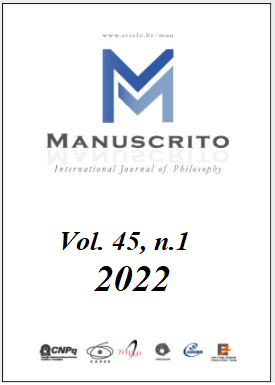Resumo
The aim of this commentary is to underpin Duffley’s notion of a stable mental content that corresponds to the literal word meaning with a computationally plausible cognitive theory. Our approach is to investigate what these stable contents could be according to the so-called Predictive Processing architecture. We argue that recent advances in cognitive science can make at least two contributions to the debate. First, they can provide some underpinning of Duffley's ideas of a stable linguistic meaning associated with the sign. Second, they provide resources to understand how the semiological principle is compatible with a dynamic and flexible notion of "meaning".
Referências
Bašnáková, J., Weber, K., Petersson, K. M., van Berkum, J., & Hagoort, P. (2014). Beyond theLanguage Given: The Neural Correlates of Inferring Speaker Meaning. Cerebral Cortex, 24(10), 2572-2578.
Carston, R. (2008). Thoughts and utterances: The pragmatics of explicit communication. John Wiley & Sons.
Clark, A. (2016). Surfing uncertainty: Prediction, action, and the embodied mind. Oxford University Press.
Davidson, D. (1986). A Nice Derangement of Epitaphs. In E. Lepore (Ed.), Truth and Interpretation: Perspectives on the Philosophy of Donald Davidson (pp. 433-446). Blackwell.
Duffley P. (2009). Does the Rubber Ever Hit the Road? What Human Language Shows about the Relation Between Mind and Reality. https://youtu.be/g2vtsdgDeC0
Duffley P. (2020). Linguistic meaning meets linguistic form. Oxford University Press, USA.
Eliasmith, C. (2013). How to build a brain: A neural architecture for biological cognition. Oxford University Press.
Fodor, J. A. (1998). Concepts: Where cognitive science went wrong. Oxford University Press.
Hagoort, P., & van Berkum, J. (2007). Beyond the sentence given. Philosophical Transactions of the Royal Society B: Biological Sciences, 362(1481), 801-811.
Hohwy, J. (2013). The predictive mind (First edition). Oxford University Press.
Langacker, R. W. (1987). Foundations of cognitive grammar. Stanford, California: Stanford University Press.
Lakoff, G. (1987). Women, fire, and dangerous things: What categories reveal about the mind. University of Chicago press.
Ludlow, P. (2014). Living words: Meaning underdetermination and the dynamic lexicon (First edition). Oxford University Press.
Löhr, G. (2017). Abstract concepts, compositionality, and the contextualism-invariantism debate. Philosophical Psychology, 30(6), 689-710.
Löhr, G. (2019). Embodied cognition and abstract concepts: Do concept empiricists leave anything out? Philosophical Psychology. 32(2), 161-185.
Löhr, G. (2020). Concepts and categorization: do philosophers and psychologists theorize about different things? Synthese. 197(5), 2171-2191. Online, 2018.
Löhr, G. (2021). Social constructionism, concept acquisition and the mismatch problem. Synthese 198, 2659-2673. Online 2019.
Löhr, G. (forthcoming, a). What are abstract concepts? On lexical ambiguity and concreteness ratings. Review of Philosophy and Psychology. https://doi.org/10.1007/s13164-021-00542-9
Löhr, G. (forthcoming, b). Does polysemy support radical contextualism? On the relation between minimalism, contextualism and polysemy. Inquiry. https://doi.org/10.1080/0020174X.2020.1868329
Löhr, G. & Michel (manuscript). Copredication in context: A Predictive Processing account.
Michel, C. (2019). The Liar Paradox in the predictive mind. Pragmatics & Cognition, 26(2-3), 239-266.
Löhr, G. (2020a). Overcoming the modal/amodal dichotomy of concepts. Phenomenology and the Cognitive Sciences 20, 655-677. https://doi.org/10.1007/s11097-020-09678-y
Löhr, G. (2020b). Concept contextualism through the lens of Predictive Processing. Philosophical Psychology 33 (4), 624-647
Ortega-Andrés, M., & Vicente, A. (2019). Polysemy and co-predication. Glossa: a journal of general linguistics, 4(1).
Pickering, M. J., & Garrod, S. (2013). An integrated theory of language production and comprehension. Behavioral and Brain Sciences, 36(04), 329-347. https://doi.org/10.1017/S0140525X12001495
Prinz, J. J. (2002). Furnishing the mind: Concepts and their perceptual basis. MIT Press.
Recanati, F. (2010). Truth-conditional pragmatics. Oxford: Clarendon Press.
Ruhl, C. (1989). On monosemy: A study in linguistic semantics. SUNY Press.
Thagard, P. (2019). Brain-mind: From neurons to consciousness and creativity (Treatise on mind and society). Oxford University Press.

Este trabalho está licenciado sob uma licença Creative Commons Attribution 4.0 International License.
Copyright (c) 2022 Manuscrito: Revista Internacional de Filosofia


